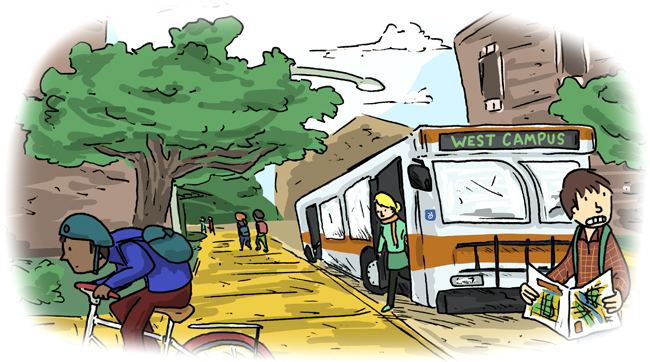Last Wednesday, I heard about my family’s plans to celebrate my grandfather’s birthday that weekend. I logged onto my computer to buy a bus ticket to Houston. I was hopeful that this would work, only to be met with a wrench in my plans: “Not available” written across the screen.
I began typing on my keyboard with desperation and refreshed the page a dozen times. Suddenly, my last-minute attempts at reserving Megabus tickets miraculously yielded a single seat opening. Unfortunately, this ticket cost three times as much as the tickets for the same trip cost in the past.
To avoid experiences like mine, students should start planning holiday travel arrangements as soon as possible.
With services like Megabus, students can purchase one-way tickets usually between $16 to $60. While it might sound logical to book your travel arrangements early to ensure that you get good deals, students frequently pay expensive prices for traveling during holidays despite making early reservations. For example, many airline tickets start off high, go down in pricing for a period, then double or triple in price as you book them last minute. Buying too early or too late can be equally costly.
Ryan Young, UT alumnus and main contributor for the Austin Metro Journal, said that this is all the more reason to start searching for deals early on. “Looking early, but not buying early, allows you to plan and search for the best deals,” Young said. “Prices frequently go down two or three weeks before a scheduled service since it’s dependent on the rate at which a certain bus or plane trip is filling up.”
In many cases, this is due in large part to a phenomenon known as yield management pricing. For transportation companies, this policy employs algorithms that are meant to sell the right seat to the customer at the best price to maximize profits. Because a lot of customers book in advance at around the same time, demand drives prices up for students who are booking too early. The same price increase happens when you get too close to the travel date because of last-minute bookers. Instead, you should get tickets once prices dip after this initial inflation period ends. There’s no exact way to know when the prices hit their lowest point, so it’s imperative to monitor the prices over time.
“For many students, both in-state and out-of-state, last minute bookings or airfare yield pricing might be the difference for going home or not for holidays,” said Young. “If you can, use public transit to reduce costs for things like ground transport. Orienting yourself with Amtrak and local bus systems helps you save some money.”
By using public transportation services like Amtrak, students can worry less about price surging since the rates are more static than their private counterparts. This alleviates the stress of holiday travel and helps keep money in students’ pockets.
For students traveling on a budget, the UT Austin Travel Management Services website has a page dedicated to “Cost Cutting Tips.” Though it is tailored for school-sanctioned trips, it includes applicable advice for reducing personal travel expenses such as creating a preliminary budget before you book the trip.
Planning early for trips returning home also gives students an opportunity to carpool home with friends. This option helps students reduce traffic as well as avoid paying ticket prices. Last-minute planning does not give you the time to coordinate this, but advanced preparation allows you to see if it’s possible.
While the holidays can be stressful with finals around the corner, traveling home should be the least of your worries. Even if you don’t purchase transportation immediately, being aware of your options is the best move to ensure that you get the best deals.
Don’t jeopardize being home for the holidays by waiting too late to plan. Don’t commit too early, but don’t be a procrastinator either.
Ancheta is a business freshman from Houston.


















